European Carbon Manufacturer Rein4ced Aims to Replace Workers With Robots
Rein4ced, a European start-up carbon manufacturer, hopes to employ automation and a new material process to put an end to the carbon industry's vicious cycle of cheap Asian labor, problematic end-of-use recycling, and to the parade of smoke-belching container ships that deliver bicycles by the millions to affluent Westerners located halfway around the globe.
For twenty years, carbon frames have been laid up by hand from "thermoset composites" - carefully cut strips of epoxy-impregnated carbon fiber spread over a flexible mandrel, then pressure cured in heated molds. Estimated man-hours for building a frame run from 20 to upwards of 30, and manufacturing is further hampered by the short useful life of unrefrigerated raw materials. All that adds up to a pricey finished product, but over time, bike makers have mastered the difficulties of the thermoset process, which has helped to keep MSRPs within reach of avid cycling enthusiasts.
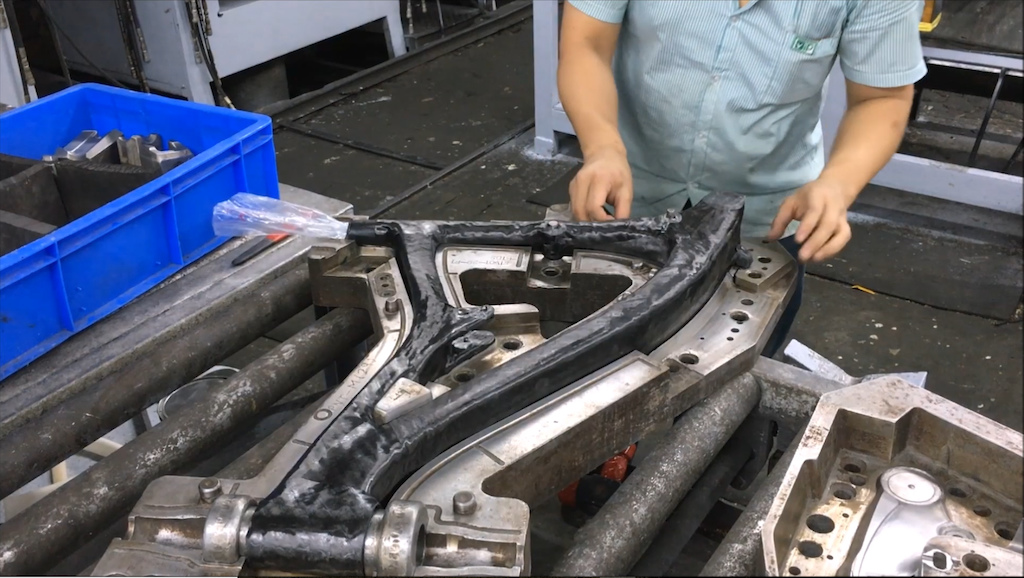
The high prices of conventional thermoset materials is a global constant, but labor is not - a cold fact that has sent the cycling industry on a stepping-stone path in East Asia, uprooting and transplanting their carbon production from one developing industrial nation to another in the search for rock bottom prices for skilled workers. On one hand, Asian manufacturing makes sense because bicycle assembly takes place close to all of the major sources of components and frames, but that precludes the financial and environmental burdens of shipping final products to customers located thousands of miles away. It works, because the cycling industry has forced it to work, but a growing number of industrialists, including the folks at Rein4ced, believe there is a better way.
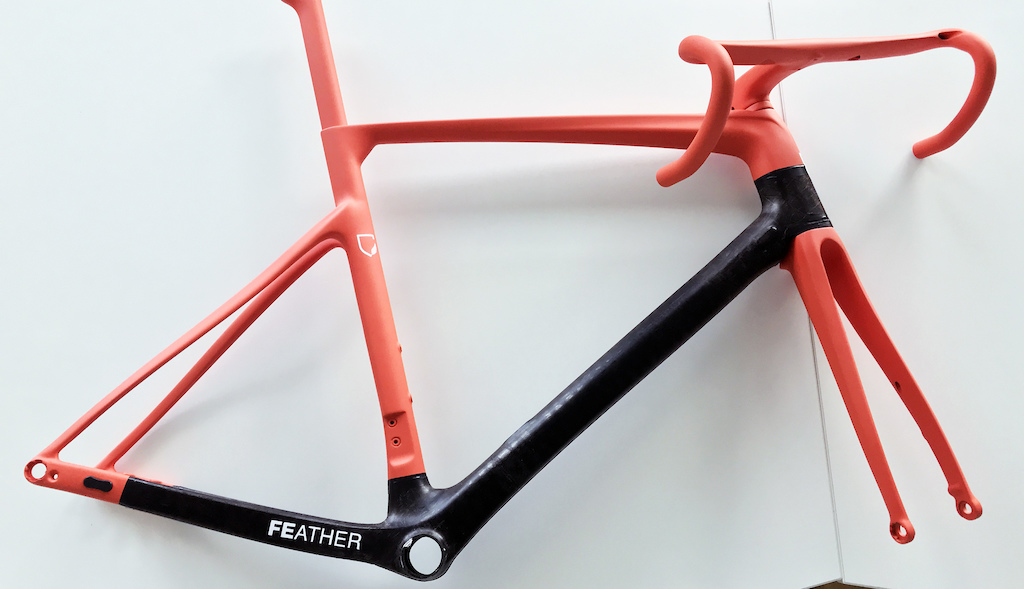
Thermoplastic vs Thermoset Carbon
Same carbon, different matrix. One uses a two-component resin that catalyzes and cross-links when heated, the other uses a resin that is re-melted. If you want the college version of the story, read James Huang's excellent feature on the subject. Here's the short version:
Carbon fibers must be kept in alignment by some sort of plastic matrix to achieve their superior strength-to-weight properties. Two-component epoxy type thermoset plastics have been the go-to for decades because the viscous resins require heat to catalyze and harden, so they can easily be rolled and saturated into the fibers while maintaining the highest possible fiber density. The up-side of thermoset materials is that they are sticky and pliable, thus easy to shape and mold. The downside is that the moment the resin and catalyst components are mixed, the irreversible hardening reaction begins. To manage the time-sensitive nature of thermoset composite materials, the impregnated carbon must be freshly made, stored in freezers and used before a defined date.
Finally, the melting temperatures of thermoplastic resins are much higher than the curing temperatures of two-component types, and the molding process requires much higher pressures to achieve comparable strengths.
The up-sides of thermoplastic composites, however, are tantalizing: unlimited storage life at room temperatures; the resins are non-toxic when handled; the materials can be easily recycled or re-purposed; and the slightly more malleable nature of the high-strength thermoplastic resins (polyetheretherketone "PEEK," polyetherketoneketone "PEKK," polyaryletherketone "PAEK") specifically developed for the process result in exceptional impact resistance and a safer failure mode.
In case you've been sleeping for twenty years, impact resistance and a safe failure mode are two unicorns that have successfully eluded cycling's carbon manufacturers since day one. "Why then," you may ask, "have they failed to use this wonderful new technology?"
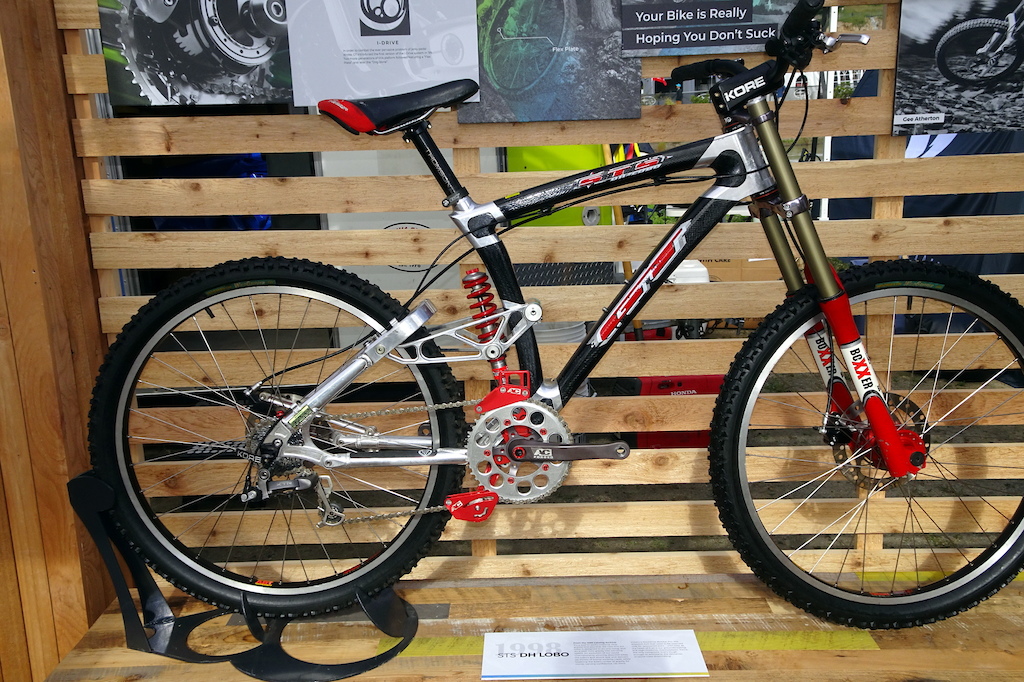
We did, and so did the aerospace industry. Back in the '90s, GT, K2 bike (I even tried it) joined high-tech giants in the race to make high-performance thermoplastic composite structures, but the materials were not up to par, and conventional wisdom did not lend itself to create designs that would better suit the process. Fast forward to the present, however, and it's a different world. Environmental concerns and manufacturing efficiency have pushed the technology to fruition. Airbus and Boeing are both using automated systems to build aircraft components with thermoplastic composites, and closer to home, US builder Guerrilla Gravity has started to make thermoplastic composite mountain bikes using a semi-automated process. No surprise then, that an entrepreneur like Rein4ced would take the plunge and invest in a full-scale manufacturing facility.
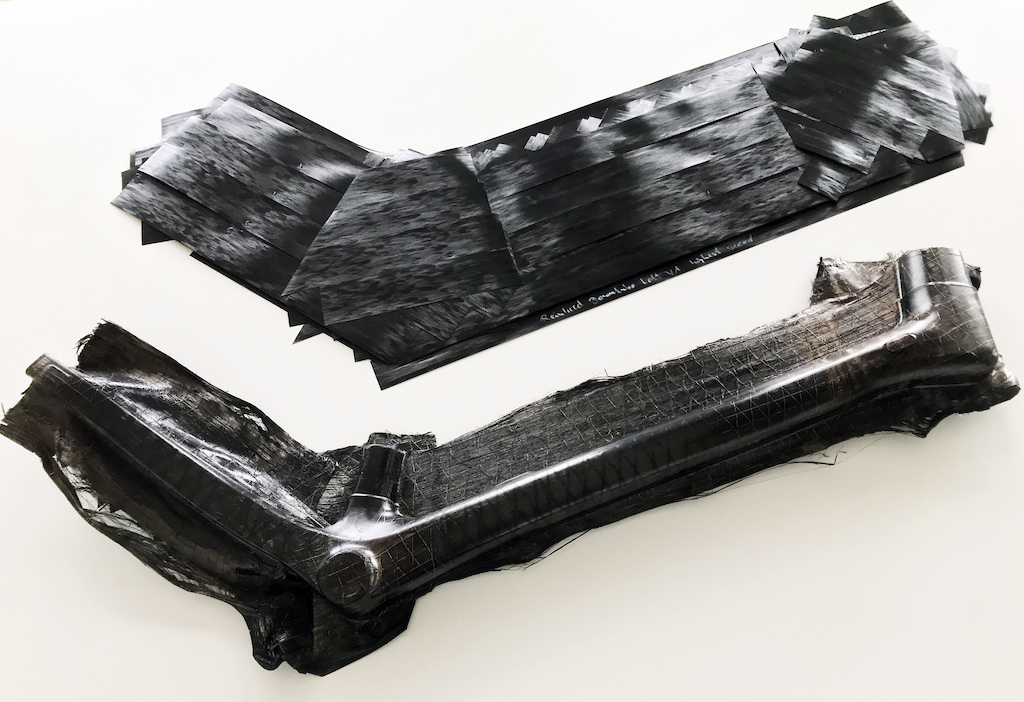
Rein4ced Has Big Plans
Rein4ced was recently founded by Dave Luyckx (CPO), Niels DeGreef (COO), and Michaël Callens (CEO), based around a hybrid thermoplastic composite material which has fine steel fibers interlaced with the pre-impregnated carbon. Reportedly, the hybrid material was conceived by Professor Ignaas Verpoest (KU Leuven) and later brought to market by co-founder Michaël Callens, who earned his PhD studying the concept under Verpoest. Key to the startup bike maker, the addition of steel fibers to thermoplastic-based carbon reportedly provides a significant increase the impact resistance and adds a margin of survivability in the event of a frame failure that conventional carbon manufacturers can only dream of. Rein4ced is so confident that they advertise that their frames are "unbreakable."
Rein4ced's three-fold plan for their new manufacturing facility in Leuven, Belgium, begins with their patented hybrid thermoplastic composite. Second to that is their decision to produce high-end frames in Europe, where they can avoid EU tariffs and shipping costs, and also communicate with one of the world's most concentrated cycling marketplaces in the same time zone.
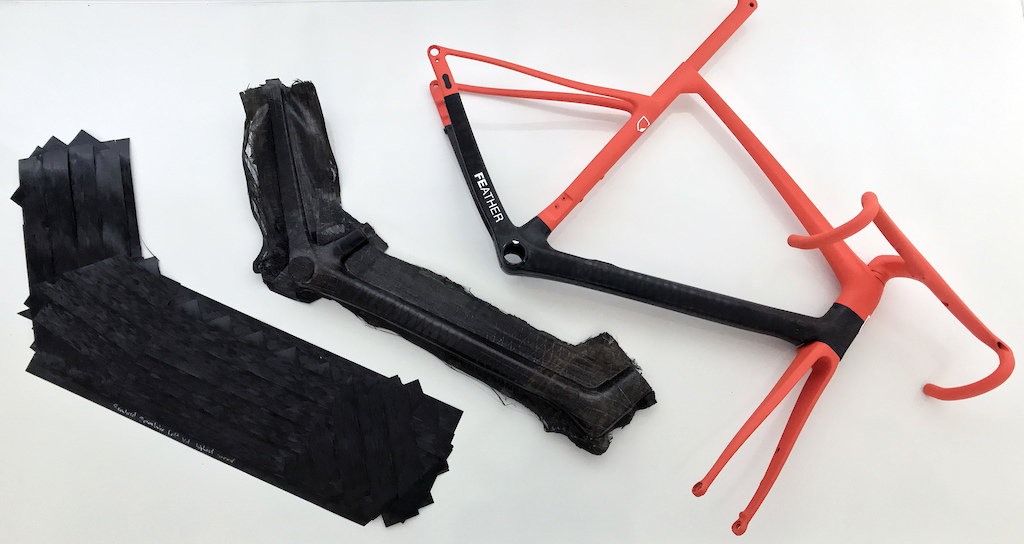
About those robots: Third? No secret that the cost of labor in Europe alone would defeat plans to manufacture carbon frames using conventional methods. Aside from saving money, the elevated melt temperatures thermoplastic composites require (340°C to 390°C) creates a risk hazard. Rein4ced is banking on an automated layup and molding system that is expected to crank out 20,000 frames per year by 2020 and as their production ramps up, they project those numbers will substantially increase. Considering that this is a relatively new and largely unproven technology to cycling, those are very optimistic goals, but it could happen.
Elon Musk overturned the automobile industry's stagnant manufacturing model armed with optimistic goals, new and largely unproven technology, and automated production. If Rein4ced is only half as successful as its founders project it will be, the lessons learned are sure to re-ignite the dwindling imaginations of cycling's conventional thermoset carbon makers who, with few exceptions, have been stuck in a rut for nearly a decade.
INTERVIEW: Rein4ced CEO Michaël Callens
 Tell us more about Rein4ced's steel/carbon material. Is it exclusive to you and is it produced in conventional pre-preg tapes?
Tell us more about Rein4ced's steel/carbon material. Is it exclusive to you and is it produced in conventional pre-preg tapes?
It is exclusive, patented by Rein4ced and the exact composition and materials are kept confidential. We don’t use the conventional prepreg tapes, but we work with high-end thermoplastic tapes.
 What is the difference in density between traditional thermoset high modulus carbon and the Rein4ced's hybrid material? What does that mean in terms of the weight of a bike frame with identical wall thicknesses?
What is the difference in density between traditional thermoset high modulus carbon and the Rein4ced's hybrid material? What does that mean in terms of the weight of a bike frame with identical wall thicknesses?
We redesign the lay-up from the ground up to make maximum use of the hybrid steel/carbon material. In many cases, carbon bikes need to implement certain safety factors and therefore have to be over-designed to ensure that they won’t break. Because of our much more damage resistant material, we can use less material in those critical zones and target high performance with similar weight as high-end carbon frames.
 How far along is Rein4ced's production readiness? Has the process been successfully automated yet?
How far along is Rein4ced's production readiness? Has the process been successfully automated yet?
Several commercial prototypes have already been successfully manufactured using the automated manufacturing technique. Currently, we are setting up the full production line capable of manufacturing high volumes (up to 20,000 frames) in-house and before the end of this year, all equipment should be installed and ready to start.
 The press-release video suggests that the robots will eventually be doing all the work. Will Rein4ced still be employing workers to complete molding and heat curing the parts, and then hand finishing after the initial robotic layups are complete?
The press-release video suggests that the robots will eventually be doing all the work. Will Rein4ced still be employing workers to complete molding and heat curing the parts, and then hand finishing after the initial robotic layups are complete?
Our initial ambition has always been to have as little human interaction as possible during actual production steps. Some parts have a very high level of complexity and performance demand. In order to manufacture these parts with a consistent result, we are robotizing as many steps as possible. Initially we have opted to still have some operators involved for taking semi-finished parts out of equipment A and transporting it to equipment B. This allows for a quick intermediate quality inspection because this is where human skills are no match for any high-tech equipment currently available.
 What are some advantages to using thermoplastic type composites?
What are some advantages to using thermoplastic type composites?
Production can go much faster, we work in a more clean environment (no chemistry involved), and scrap material is recycled in dropouts [and other small parts].
 Who invented the material, and who developed the automated process?
Who invented the material, and who developed the automated process?
The idea for using steel fibres in composites came from Professor Ignaas Verpoest (KU Leuven), under whose supervision CEO Michaël Callens did his PhD on this material (2010 - 2014). Rein4ced was founded in 2015 where further work was done on the development of lightweight hybrid composites. This new hybrid material was patented by Rein4ced. The manufacturing process (a new construction method / way of building a bicycle frame) was developed by Rein4ced, and is based on state-of-the-art equipment developed for automotive and aerospace applications.
 At what level will your first production be targeted: mid-priced, enthusiast level, pro level?
At what level will your first production be targeted: mid-priced, enthusiast level, pro level?
High-end bicycles for all target groups. We are taking full advantage of the high accuracy placement of the material and high quality process. This gives us the opportunity to build frames with the exact requirements the designers and engineers of the brands we are working with; be it comfort or aggressive racing performance. Their ideas and concepts can be translated immediately into real products using our material and manufacturing process.
 Will Rein4ced's facility also finish-machine, paint, decal and otherwise deliver sell-ready frames to its customers?
Will Rein4ced's facility also finish-machine, paint, decal and otherwise deliver sell-ready frames to its customers?
Rein4ced will manufacture directly for bicycle brands. We are opening a whole new set of possibilities for their designers and engineers to work with and this will hopefully lead to “better” products for their customers: the bike enthusiasts. Their frames will [arrive] ready to paint, unless otherwise requested.
 Will costs be on par, less than, or greater than Asian competitors?
Will costs be on par, less than, or greater than Asian competitors?
Straight from the factory, the frames will be more expensive. We will be offering a product with much higher performance potential and a much higher level of quality consistency. We will be able to limit the variations in production, something which is inherent to the current manual production in Asia. End consumers will be able to experience the ride quality and bike handling as it was originally designed and engineered by the brand.
42298 views

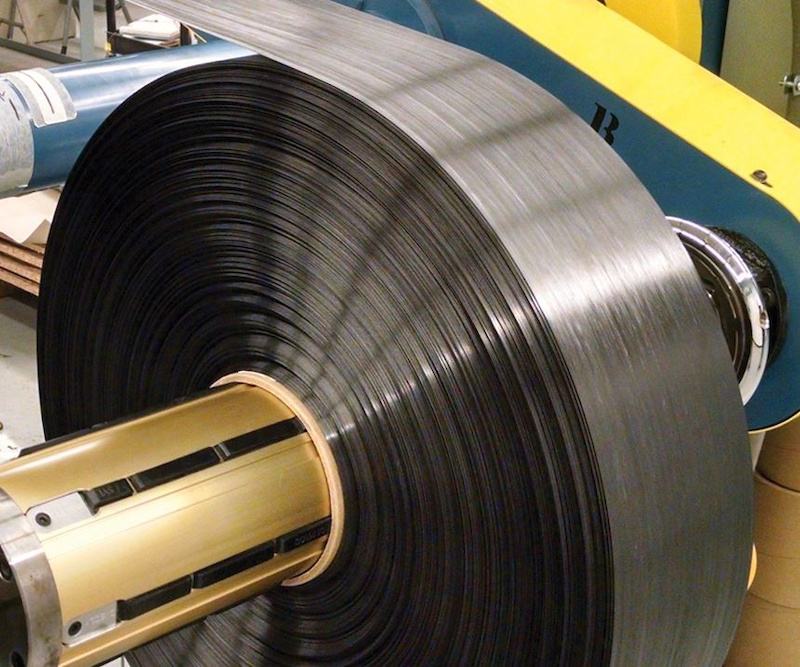
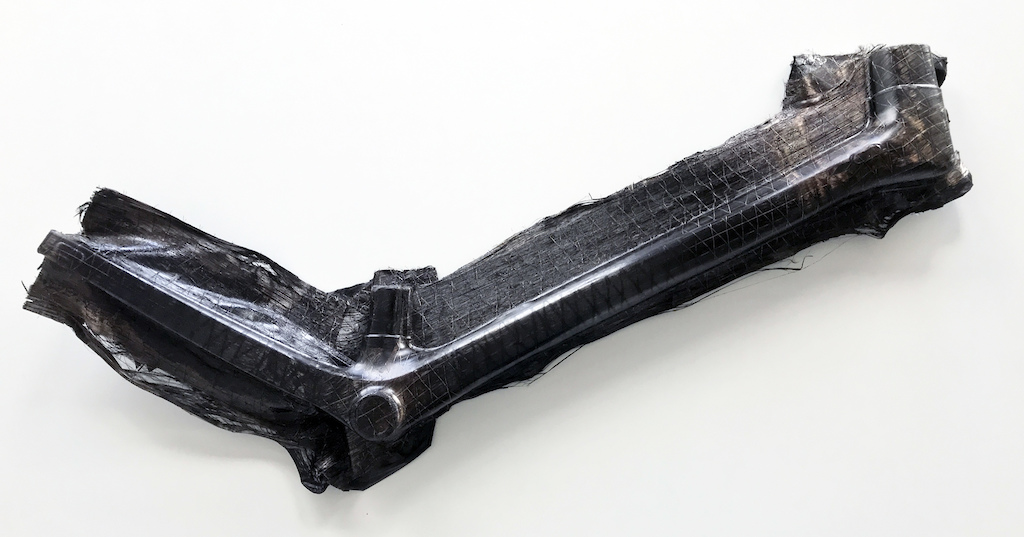

Diy’tk,R’jaaaaaaeb!!!
In the book the authors go through some of the global trends they see in labour like: the precarity of the developed economies' working class intensifying due to a surplus global labour supply, slum populations growing due to automation of low-skilled service work, transformation of higher eduction into job training hastened in a deperate attempt to increase the supply of high-skilled workers etc...
But in a smart move the authors instead of choosing the old reformative option of stopping these changes (which they think is very hard to) they form four minimal demands to suggest a more sustainable economic future and to push the current form of capitalism to a quicker death:
1.(Demand) Full Automation;
2.(Demand) The reduction of the working week;
3.(Demand) The provision on the basic income;
4.(Demand) The diminishment of the work ethic.
I am sure to some this may seem like a utopic non-sense, but a big portion of their arguments will fall very easily in a pragmatic analysis of where we are now as a society and how our economies work in a global scale.
I believe tbh that there are certain jobs that no-one should do at this point of humanity's history for example laying carbon in a repetitive motion for 12hours/day in a probably hazardous factory only for their kids to be -maybe- in a slighlty better position in the future. If these people could do this for 2-hrs with some help of robots, have a decent salary and then time to spent with their families, our world would be much better!
Long comment I know, but it's not an easy issue nor one to tackle with smart humourous phrases. We need to find ways to make these technologies work on our behalf rather than against us.
Sure there are douchebags exploiting it bit they are few and at least at my work if anyone did that a few times with smug smile, they would be socially excluded in various ways.
There is enough psychological evidence showing that epidemic of depression is due to lack of hardship. We are all better off now, no doubt about it, but in post scarcity economy we will have it harder and harder to find meaning to our lives.
Now days in the modern era 21st century style, we seem to be going backwards.
Now, where can my friend Bender apply for a job in one of these new fa-dangled Carbon Factories??
It's like a a company telling us their employees have a safe and/or work environment. Then OSHA or someone like ISA, ISO, etc come in and inspect the place and they can't even pass the most basic inspection.
Unless there is some outside organization that certifies the sustainability of their practices, it's just a sales pitch. Clean, useful and efficient recycling that doesn't generate more waste from energy consumption, byproduct production and pollution from off-gassing, waste & particulate poisons when you're talking about mixing carbons, plastics & steel? There is a lot of magic in the world...but get real.
Maybe GG needs to contract out frame making to some other bands?
They have a different manufacturing process, and use their own process for curing (higher heat etc.) which means they are using a different curing and taping process. So I think its safe to say that its a BIT more than a "couple CNC machines".
www.youtube.com/watch?v=mT3vfSQePcs
I'd guess the price will be high because they've spent 4 years developing their manufacturing process and that research doesn't come cheap. R&D is expensive.
Cool! Now do cars, iphones and bananas please.
I'm all for carbon emission reduction but also, what to do with all of those displaced workers. Complicated issue.
Most of the time automation just means that humans can focus on the stuff humans are good at and leave the rest to machines.
The important part is to provide safety nets and opportunities for people to switch tasks, and to somewhat evenly redistribute the wealth gained from automated production.
You're last paragraph sounds perfect, the only issue with it is that's never gonna happen.
― Arthur C. Clarke, 2010: Odyssey Two
I did also wonder why they came to conclude why bikes was the best place to start. Maybe they're roadies? Anyway, good for us.
cyclingiq.com/2015/12/12/road-to-impeccable-bike-proves-impassable-for-bmc
@bizutch: TenCate's projects have been to show that it CAN be economically viable and they've done that.
Especially in instances where the product is getting more expensive each time. Doesn't really pass the smell test of ethics.
Journalist: How much will cost each of those frames?
Rein4ced: 10K!
Why "someone"? Robots will eventually do that too.
Robots.
Can I bike from Brussels with my hammer and try it out?
Will someone please call Nathan Rennie?
Or should I just carry on as before....
Also, the Sail GP boats can be broken down to fit in a standard 40' iso and they use removable hull sections to make them fit.
A lot of masts are multiple sections that sleeved too due to manufacturing constraints, that's where predictable bending is critical for sail shape.
I believe that lugging and bonding is probably pretty predictable for ride characteristics, you want tubes to generally be thicker on the ends and the high stress areas are primarily where the tubes are joined. If you have more control over the compaction and resin saturation then you likely can remove mass from the less critical areas in the tubes.
I get your point about removing material from the centre tube sections but you could compromise impact resistance in those more prone to damage areas. I really don't know as I'm no composite engineer but it just doesn't seem optimal and looks to me like they're mainly going down the thermoplastic route for cost (labour) not performance reasons.
Cheers!
Yeah racing dingies are pretty rad. Being sort of singular in purpose, so optimization doesn't really matter, what's important is the sailor. To win in a class like the Laser, you remove all of the 2% stiffer for 2020! 3% better flow! Instead you get a bunch of people sailing supposedly equal boats with the only difference being fitness and decision making. It really removes the equipment from thr equation. (To some extent at least)
Have you got a link to your source info on the automation creating human jobsI’d like a read.
Being serious not taking piss.
www.washingtonpost.com/technology/2018/09/18/machines-will-create-million-more-jobs-than-they-displace-by-world-economic-forum-says/?noredirect=on&utm_term=.d7d63d7fb5ce
www.mckinsey.com/featured-insights/future-of-work/five-lessons-from-history-on-ai-automation-and-employment
cacm.acm.org/news/220768-what-the-industrial-revolution-really-tells-s-about-the-future-of-automation-and-work/fulltext
www.skynettoday.com/editorials/ai-automation-job-loss
If you really want to share in profit and wealth creation, buy the shares! You might even discover there are no free lunches for shareholders.
You need a hug buddy!
I've considered working for myself before getting on with a utility